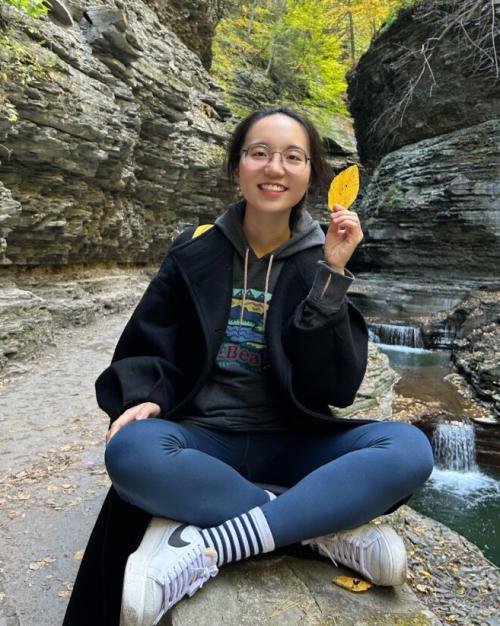Nianpo Su is a doctoral candidate in linguistics from Nanjing, China. She earned her B.A. at Tsinghua University in Beijing, China and now studies how syntactic principles determine the structure of sentences in human languages under the guidance of Miloje Despic and Helena Aparicio at Cornell.
What is your area of research and why is it important?
I study how syntactic principles determine the structure of sentences in human languages, using both theoretical and experimental approaches. My research focuses on Nuosu Yi, a minority language spoken by the Yi people in the mountainous regions of Southwest China. Unlike typical classifier languages such as Mandarin and Japanese, Nuosu Yi stands out for having a definite determiner (similar to “the” in English). By examining how classifiers interact with the definite determiner in Nuosu Yi, my work sheds light on cross-linguistic patterns in determiner phrase structure. I also conduct linguistic experiments to explore how Nuosu Yi determiner phrases convey semantic meanings, particularly in marking definiteness.
What are the larger implications of this research?
My research has both theoretical and cultural significance. Understanding how Nuosu Yi marks definiteness contributes to the broader typological study of classifiers and determiner phrase structures. It provides a unique perspective for testing and refining both theoretical and psycholinguistic theories. Furthermore, my research has implications for raising awareness of the Yi language, which is facing dramatic language loss. Many Yi people no longer pass the language on to their children, and the new generation struggles to speak it fluently. By documenting and analyzing Nuosu Yi’s unique grammar, my research aims to support language revitalization efforts and foster greater appreciation for Yi language and culture.
What have you gained by participating in the NextGen Professors Program?
Through this program, I have gained both invaluable resources and strong peer support. As the first Ph.D. student in my family, I initially lacked a clear understanding of how to prepare for academic job applications—how to create a career plan, prepare application materials, and identify external fellowships and opportunities. This program provides detailed guidance and relevant websites, giving me a clear roadmap for accessing useful information. Additionally, the small interdisciplinary group I was placed in includes two postdocs and a doctoral student from social science fields. Our group discussions have always been supportive. I have been fortunate to learn from my peers’ experiences, form friendships, and build rapport with one another.
How has this program been helpful in working toward your professional goals?
This program has been instrumental in preparing me for my professional goal of becoming a linguistics scholar and instructor in two key ways. First, the monthly meetings have provided invaluable guidance on tailoring application materials for different institutional types. For example, I learned to highlight mentoring experiences for R1 institutions and to emphasize my teaching philosophy for teaching-focused institutions. Second, the group discussions with doctoral students and postdocs have been both inspiring and supportive. Hearing about the challenges faced by peers with more experience has deepened my understanding of the job search process and inspired new reflections for my own career development.
What are your hobbies or interests outside of your research or scholarship?
I am an avid climber and enjoy both bouldering and top-rope climbing. Over the past semester, I visited Cornell’s Lindseth Climbing Center more than 50 times! Beyond climbing, I enjoy running, listening to audiobooks, and watching NBA games.
Why did you choose Cornell to pursue your degree?
I chose Cornell for two reasons. First, its linguistics program combines theoretical and experimental approaches, which aligns perfectly with my academic goals. I have the privilege of working with Dr. Miloje Despic, a theoretical syntactician, and Dr. Helena Aparicio, an experimental linguist. Working with them as their Ph.D. student has been a joyful and rewarding journey that has shaped me into a better linguist and scholar. Second, Cornell’s East Asia and cognitive science programs provide incredible resources and opportunities. Over the past three and a half years, I have taught Mandarin (CHIN 2201) and was honored to receive the C.V. Starr Fellowship, along with several research and travel grants that have supported my fieldwork in Southwest China




